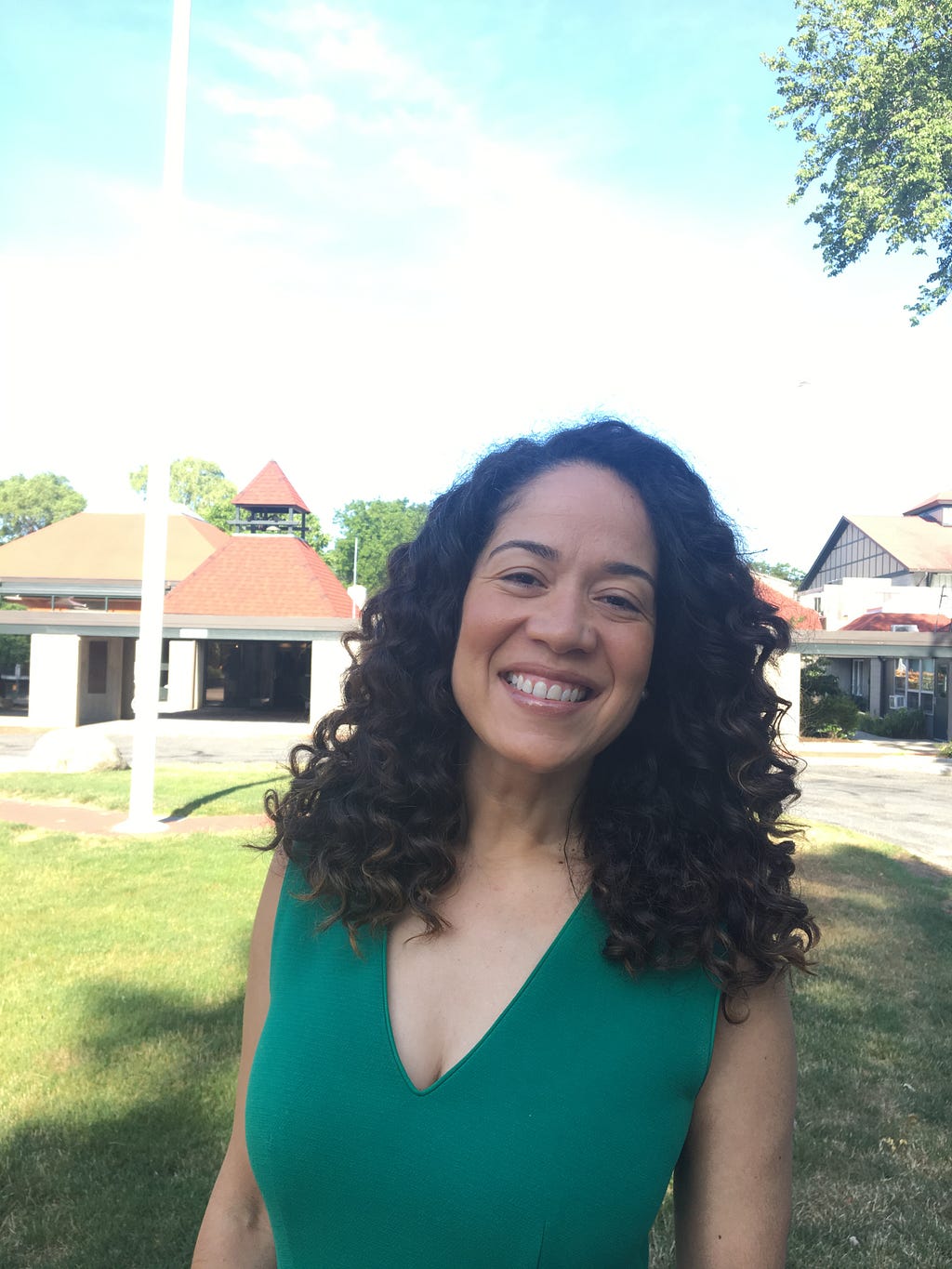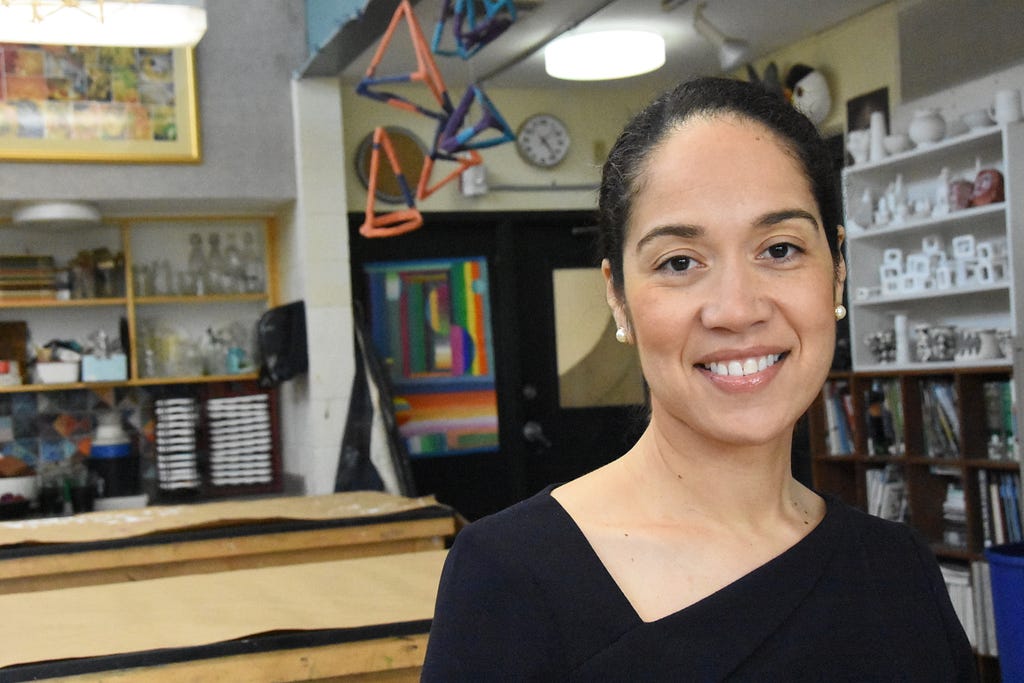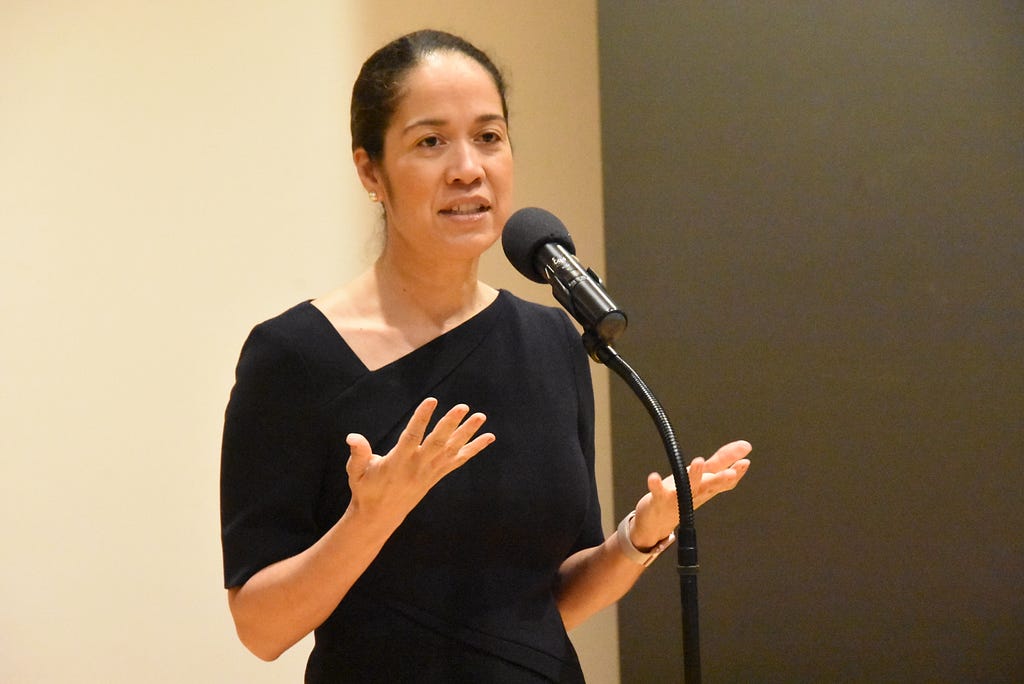“You don’t have to wait for the right time or the right position to become a leader.” With Dr. Noni Thomas López and Fotis Georgiadis

You don’t have to wait for the right time or the right position to become a leader. You can do it on day one. Leaders aren’t born; they’re made. Once I decided that was what I wanted to be, I went about learning the skills to be good at it. I studied my craft. I read books, attended workshops, pursued advanced degrees, prioritized networking and mentorship (as both a mentor and mentee). I’m basically a leadership junkie.
As a part of my series about “Black Men and Women of The C-Suite”, I had the distinct pleasure of interviewing Dr. Noni Thomas López. On July 1, 2018, Dr. Noni Thomas López joined the Gordon School in East Providence, RI as their new Head of School. Gordon is a racially diverse, coeducational independent school serving students in Nursery to eighth grade. Before her move to New England, Noni spent over twenty years as a teacher, administrator, and consultant in New York City independent schools. Most recently, she completed a four-year tenure at Ethical Culture Fieldston School (ECFS) as the Assistant Head of School for Teaching and Learning. Before joining ECFS, Noni served as the Head of Middle School at the Nightingale-Bamford School for five years; prior to that, she was the Middle School Director at the Calhoun School. From 2010–2013, Noni served as a trustee of the Caedmon School, and she is currently Vice Chair of the Board of Trustees of the Bronx Charter School for the Arts. In 2013, Noni founded the Interschool Leadership Institute for Educators of Color, which will welcome its seventh cohort in June 2019. Noni was a member of the New York State Association of Independent Schools’ (NYSAIS) Diversity Committee for six years, and she has presented on leadership and diversity at the National Association of Independent Schools’ Annual and People of Color Conferences, the NYSAIS Emerging Leaders Institute and Diversity Practitioners Conference, the North Carolina Association of Independent Schools’ Women in Leadership Conference, and the 2019 Women’s Summit at Bryant University. Noni has consulted at universities as well as public and private schools on curriculum, organizational leadership, and diversity, equity and inclusion, and provides executive coaching to educators and non-profit leaders. Noni holds a B.A. in English from the University of North Carolina at Chapel Hill and earned her M.A. in Private School Leadership at Teachers College where she was awarded a Joseph Klingenstein Fellowship. In 2016, she completed a doctorate in Educational and Organizational Leadership at the University of Pennsylvania.
Thank you so much for doing this with us! Can you tell us a story about what brought you to this specific career path?
I had no plans to go into teaching. Throughout my life, my family struggled financially; I literally grew up on the wrong side of the railroad tracks. If I wanted to make money, teaching was not the way to go. As I was preparing to graduate from UNC with a degree in English (smart choice for someone looking to make money, huh?), I considered going to law school, but I knew I just didn’t have a passion for it. So, I went to get some advice from my former 8th grade English teacher, and he suggested coming back to my alma mater to teach as an assistant in their lower school. I was not excited about it, but I had no other options.
A few weeks into the job, I knew I had found my calling. There is nothing like working with young people. When you help a child see something in themselves — a gift, a talent, the beginnings of passion — you can shift the trajectory of their lives. It is sacred work.
Can you share the most interesting story that happened to you since you began your career?
I don’t know how interesting it is, but I think of the moment when I became sure that I wanted to become a teacher. In the same instant, I also knew that I wanted to be a leader.
My first job in teaching was at the predominantly white private school that I attended from the seventh to twelfth grades. I was the only black girl in my class, and I never had a teacher of color in my time there. When I returned as a teacher, I wanted to be one of the people making the big decisions, decisions that would impact students of color like me who struggled at times to navigate a very affluent and very white space. Like Aaron Burr in Hamilton, I wanted to be “in the room where it happened.” So, from my first teaching job until the last one before I became a middle school principal, I have also always held some kind of administrative position.
You don’t have to wait for the right time or the right position to become a leader. You can do it on day one. Leaders aren’t born; they’re made. Once I decided that was what I wanted to be, I went about learning the skills to be good at it. I studied my craft. I read books, attended workshops, pursued advanced degrees, prioritized networking and mentorship (as both a mentor and mentee). I’m basically a leadership junkie.
Can you share a story about the funniest mistake you made when you were first starting? Can you tell us what lesson you learned from that?
I’m an introvert. A big one. When I started my first teaching job in a new school, I pretty much kept to myself. But my partner teacher really wanted us to be friends. She would ask me out on “dates” on almost a weekly basis. I kept finding an excuse to say no. Plus, she was white. I hadn’t had a white friend since middle school, and that was intentional.
One day, she could tell I was not myself and asked if I was okay. I took a chance and shared with her that I was having a very difficult time managing my relationship with my son’s father. She listened; she affirmed me; she was a friend. And she has remained one of my best friends ever since. The funny part of the story to me is that we joke now that she forced me to be her friend!
I learned an important lesson that I try to share with folks I mentor today. As people of color in professional spaces, we often have to wear the mask; we mask our vulnerabilities and code switch to get by. We leave pieces of ourselves outside of one of the places where we are supposed to feel most fulfilled — the place of our calling, of our vocation.
That’s important self-preservation. But as we protect ourselves, it’s also important that we stay present to those people that can provide an oasis, a safe port in the storm, and it’s important that we stay open to the possibility that those people may not always be who we expect them to be.
Can you share three reasons with our readers about why it’s really important for a business to have a diverse executive team?
1. We cannot grow in an echo chamber. As a leader, I worry if I feel like I am the smartest person in the room or if there is no dissent in the room. Organizations cannot reach their full potential if ideas, practices, and ways of being aren’t challenged. People of diverse backgrounds, cultures, and experiences bring in diverse ideas, elevate the discourse, and foster personal and professional growth for everyone.
2. We do better work. Schools and businesses serve diverse populations. We are more effective in fulfilling our mission when our leadership reflects the diversity of the people we serve. How many times have we seen companies make egregious decisions (ahem, Gucci) that could have been easily avoided if more diverse voices had been around the table?
3. We are more profitable. While profits don’t apply to my line of work, revenue does. As families seek out school options for their children, more and more of them are examining the diversity of the students, faculty, and administration and asking questions about our equity and inclusion practices. Consumers are asking the same of the market. They want to see themselves and their experiences reflected in the companies to whom they give their dollars.

More broadly can you describe how this can have an effect on our culture?
In my profession, I work with many families of privilege. And whether students are affluent or not, arguably they will leave our school with some measure of advantage just by dint of having a private school education.
So what will they do with that privilege? Our students here at Gordon have been talking about race, equity, and social justice, and they have been a part of a diverse learning community that requires them to respect multiple perspectives and experiences. They will have those lessons with them forever, and when they are in the C-Suites, in the courtrooms, and in the halls of Congress, they will be doing good. They will be dismantling the systems of inequity that prevent everyone in our society from reaching their full potential and enjoying the benefits of a democratic society.
Can you recommend three things the community/society/the industry can do help address the root of the diversity issues in executive leadership?
1. Recognize how institutional systems, racism and sexism in particular, have created the barriers that prevent more people of color from getting to the C-Suite. It’s not a pipeline problem. Just today, a parent shared with me the story of his friend Mohammed who sent out ten resumes and didn’t get one call. The first call for an interview came after he made the decision to legally change his name to John. There are systems that are actively working and that have been working since the founding of this country to keep the C-Suite looking a particular way. “Leaning in” is not the answer. We have to deconstruct the system.
2. Once we acknowledge these systems exist, companies need to center anti-bias training and liberatory practices and create structures and metrics for accountability. We have to know what success looks like. There are people who are trained to support organizations in this work. Find them. Hire them.
3. We need to stop holding up as examples folks of color who have made it to the C-Suite and using them as proof that “we can all do it if we just work hard and believe in ourselves.” Role models are inspiring, but these successes should be the norm, not the exception. If we aren’t examining the systems at play, they will continue to be the rare exceptions.
How do you define “Leadership”? Can you explain what you mean or give an example?
I like thinking about leadership as analogous to stewardship. Author Peter Block actually sees stewardship as an alternative to leadership and defines it as “the willingness to be held accountable for the well-being of an organization by operating in service, rather than control, of those around us.” As a leader, I believe my job is to partner with others to shape the discourse of our community to ensure that the work we are engaged in is always aligned with our core values and is a space where each one of us feels empowered to discover and enact our purpose.
What are your “5 things I wish someone told me when I first started” and why. Please share a story or example for each.
1. Know your worth. Don’t be afraid to advocate for yourself. When I asked for my first raise, my boss thanked me for asking. She — yes, she was female — she warned me that many women will talk themselves out of a raise and never have the conversation. You may not always get a yes, but you should always know and be able to articulate your value.
2. Don’t waste time feeling guilty. Get into action. When I made mistakes, I would spend a lot of time feeling bad about myself and the people I impacted. The best thing to do when you mess up is to take responsibility for it, learn the lessons that need to be learned, and use the experience to do better next time.
3. Having difficult conversations is a skill. You get better at it only with practice. Conflict avoidance only makes a situation worse. There are great resources for managing conflict; if this isn’t your strong suit, you can build your skill set.
4. Prioritize your self-care. As a leader, others follow your example. If you encourage your employees to spend time with their families, but you are sending them emails at 3:00am, what message are you really sending? Flight attendants have great instructions for life: put your oxygen mask on first, before helping others. But this doesn’t mean that you should wait for a crisis to prioritize your self-care!
5. View networking as an essential part of your professional practice. Often, we turn to our networks or look to build our networks when we start a job search or seek a promotion. People of color, especially, should view networking as a lifestyle. A 2018 study in the Harvard Business Review found that social connections lead to greater career success, but it is important that these relationships are meaningful ones. Building those kinds of relationships takes time and intentionality.
You are a person of enormous influence. If you could inspire a movement that would bring the most amount of good to the most amount of people, what would that be? You never know what your idea can trigger. 🙂
Enormous influence??
I suppose I would be interested in building a movement of spiritual education in secular schools. To be clear, I am not talking about religious education. I’m talking about cultivating in children a sense of something — be it nature, the divine, or the inherent humanity of others — greater than ourselves that drives us to do good. What would it mean if schools could help children become more deeply connected to themselves and understand more deeply their connectedness to others?
Schools should be places where children and adults find purpose and meaning. That seems to me to be a deeply spiritual endeavor. I wish there was a term other than spirituality to describe what I’m talking about because people in schools, for understandable reasons, tend to freak out when they hear the word. Let’s get a new word. Maybe that’s what my idea can trigger!

Can you please give us your favorite “Life Lesson Quote”? Can you share how that was relevant to you in your life?
One of my beloved mentors is a huge Mary Oliver fan, and she introduced me to Oliver’s poem “The Summer Day,” which contains the famous line, “Tell me, what is it you plan to do with your one wild and precious life?” Oh, there is so much in that one line!
I feel so grateful for knowing my purpose, and so much of my work in education, whether it be with children or adults, is about creating spaces where others can discover their purpose. Mary Oliver reminds us that we only have one go-round on this planet, so I do not want to spend my limited time on earth feeling guilty, ashamed, regretful, or doubtful of myself. That’s not the way that I want to honor the precious gift of my life.
Now, that is not to say that I don’t feel all of those things — sometimes all at once! But I am able to consistently bring myself back to myself, if that makes sense. Living a purposeful life is a daily practice.
Is there a person in the world, or in the US whom you would love to have a private breakfast or lunch with, and why? He or she might just see this, especially if we tag them. 🙂
Not very original, but I really need to meet Barack Obama. I don’t even need lunch. Just let me touch the hem of his garment! I joke, but there is something about the power of someone’s aura. It’s the reason people would line the streets to see the Pope or JFK just for a few seconds. President Obama is far from perfect, but for me right now, he is the embodiment of possibility and of hope. I feel like we are in need of that right now.
How can our readers follow you on social media?
Follow me on Twitter @nonithomaslopez!
This was very meaningful, thank you so much!
Thank you!
“You don’t have to wait for the right time or the right position to become a leader.” was originally published in Authority Magazine on Medium, where people are continuing the conversation by highlighting and responding to this story.



